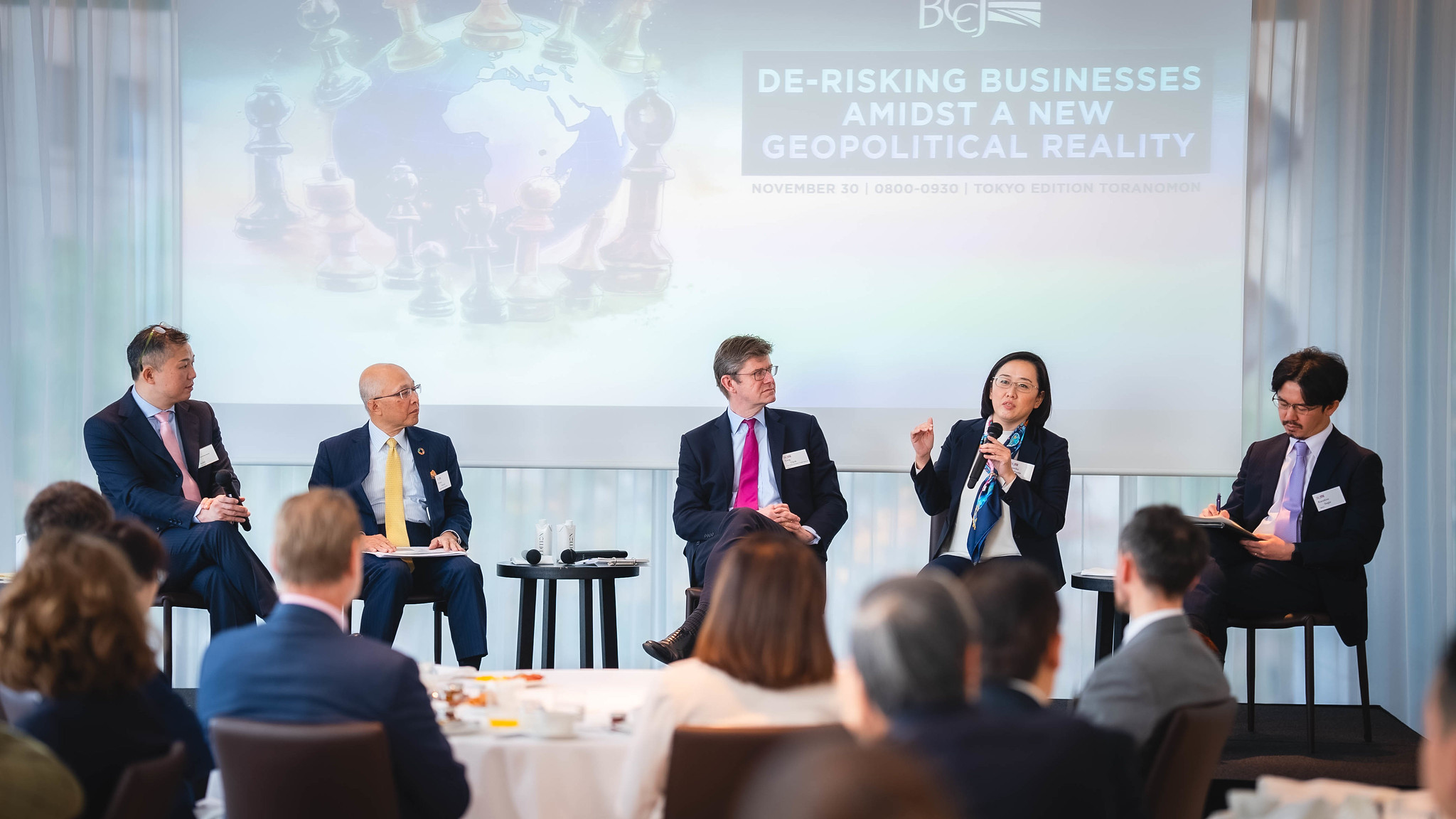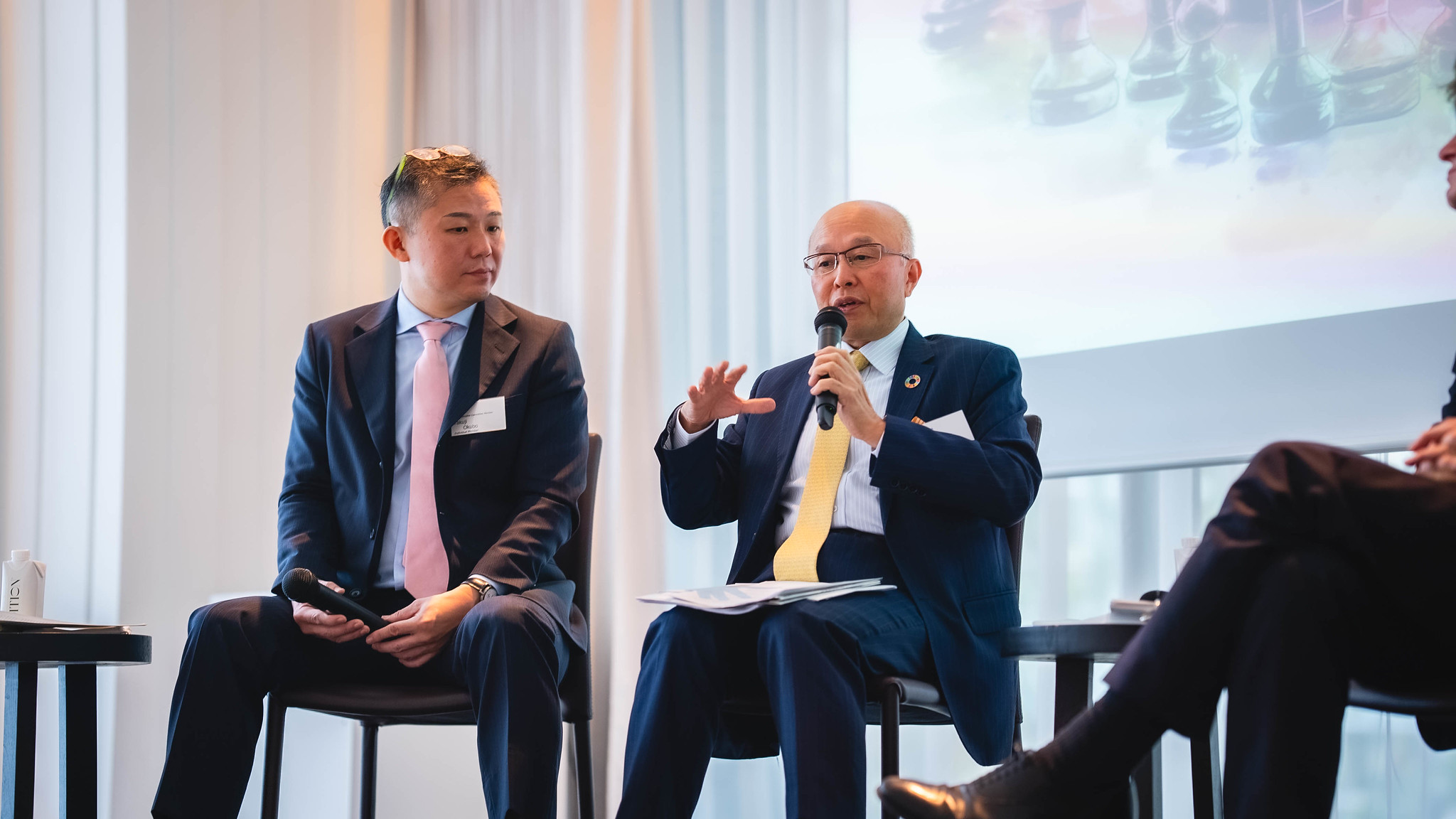Member? Please login
De-risking businesses amidst a new geopolitical reality

Written by Sterling Content
December 21, 2023
Past Event Round Ups
With businesses facing an ever-shifting geopolitical reality, the British Chamber of Commerce in Japan held an event in late November where an expert panel explored how to strike the right balance between economic efficiency and risk-minimisation.
The speakers were Greg Clark, the UK Prime Minister’s Trade Envoy to Japan; Kazuhiro Sugie, director of security trade control policy, Trade and Economic Cooperation Bureau, Ministry of Economy, Trade and Industry; Kumiko Pivette, senior manager and geopolitical risk advisory lead, PwC Japan LLC; and Hideo Suzuki, executive advisor at Nippon Steel Corporation, with moderation from Takuji Okubo, managing director at Japan Macro Advisors.
National policies
The speakers noted that turbulence is one of the big drivers shaping security policy today. Economic security has become increasingly more entwined with national security, accelerated by several key global events. These include the Covid-19 pandemic, which exposed the fragility of supply chains and risk of depending on just-in-time processes for manufacturing, and the Russia–Ukraine conflict, which has increased international energy prices and prompted discussion on energy security.
Recent technological development also means the distinction between technologies of military and civilian use are not as clear as they once were, which is contributing to the broadening scope of national policy of governments.
When asked about government intervention in business is founded, it was noted that the rise in importance of national security is driving pressure to tread the right path. The nature of national security means it cannot be openly discussed, but is possible for checks and balances to be used so that government intervention is not misused to introduce a regime of protectionism for economic or political purposes.
It was also recognised that links between government and business are much more interlinked that ever, particularly in technology and innovation, for example the development of Covid-19 vaccines.
Furthermore, the risks posed by global events such as the Covid-19 pandemic and Russia’s invasion of Ukraine are too big for the private sector to manage alone, so there is a case for government managing economic and security risks in collaboration with the private sector. Businesses’ concerns about greater government involvement—for example in trade, innovation or the global market—can be alleviated by greater communication between government and the private sector.
It was also noted that government regulations and guidelines can help companies introduce systems that aid them in understanding and managing risk. Furthermore, when operating in countries where the business environment is deteriorating, companies can appeal to government for support. And companies involved in industries or technologies classified as priorities for government can talk to government to find solutions to the deteriorating environment that still allow them to benefit from the market.

Global leadership
The speakers noted that although some global institutions, such as the United Nations Security Council and the World Trade Organization, have come under strain and scepticism, they still have a role to play. For example, NATO has provided equipment, training and financial support for Ukraine.
Also noted were the benefits of the G7. It was described as having an important role in international order and being acknowledged globally as a success, thanks it its ability to distil a sense of joint-working and co-purpose at difficult times across different countries. The most recent G7 summit, held in Hiroshima in May 2023, also addressed the roles of the Global South and the rest of the world.
Still, the limitations of institutions like the G7 were noted, and it was suggested that greater consensus could only be attained by considering common principles, rather than common ideologies, that can be agreed upon, Without doing so, the world would remain divided. In addition, greater cooperation between government and the private sector could bring more countries to the table.
The speakers pointed to recent data that shows almost half of the top 10 risks named by companies in Japan relate to China. Concerns range from the nation’s weakening economy to the loss of visibility of the nation’s regulations. In short, companies are eager to know how to do business with China while lowering business risks.
On the other hand, 30–40% of corporate executives surveyed said the investment environment is continuously deteriorating year-on-year. China is no longer the top priority destination for investment.

Business efforts
Looking at national security, 64% respondents in a 2022 JETRO survey of 550 companies—ranging from global entities to SMEs—said they had strengthened their function to collect information regarding national security issues. One third declared their intent to make guidelines for how to cope with national security issues while 22% said they would create a new division to respond to national security.
It was noted that the survey results show awareness is rising among companies but issues remain. According to respondents, these issues include a lack of experienced personnel and difficulty to collect information. There is therefore a need for businesses to expand their capabilities in geopolitical risk so they can analyse situations, make informed business decisions and strengthen their position.
The speakers noted that three areas where the relationship between private sector and government is important: building resilient critical infrastructure, strengthening intellectual property management and cyber defence, and addressing climate change. It was noted that in the UK, businesses are able to draw on the resources of the National Protective Security Authority for informational and guidance about security risks.
In summing up, it was noted that many businesses will find public policy—much of which is motivated by security policy—of increasing importance for their smooth operations. A sophisticated understanding of the direction of public policy and the ability to shape it in a positive way will become a core competence for modern businesses.
However, looking ahead, it will also be critical for businesses to demonstrate leadership on a range of matters including climate change, consumer opinion and reputational risk.







